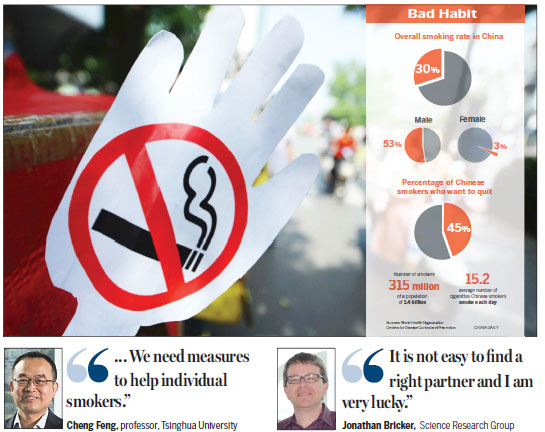Scientists team up to cut smoking
It started with a brief but poignant comment from China's first lady Peng Liyuan, and it has led to an American psychologist and smoking-cessation researcher and a Chinese scientist working together to solve one of China's biggest problems: helping 316 million smokers quit.
When she accompanied her husband President Xi Jinping on a trip to Seattle last September, Peng visited the Fred Hutchinson Cancer Research Center. She met with center president and director Gary Gilliland, philanthropist Bill Gates and others.
The visit's purpose was for Peng to learn more about collaborative efforts between the center and China.
During her visit to the cancer center's campus, Peng was briefed by Jonathan Bricker, head of the Tobacco and Health Behavior Science Research Group at the center. He spoke about his research using a clinically proven smoking-cessation app for US smartphones. Studies show that using the app is two to three times is more effective than trying to quit cold turkey.
Peng has led a campaign to lower smoking rates in China, where an estimated 1 million die each year of tobacco-related causes, according to the World Health Organization. In 2012, she and Gates appeared together to promote an anti-smoking campaign in Beijing, ahead of the 25th World No-Tobacco Day.
After Bricker told Peng that a similar app could help 16 million people a year in China quit, Peng said, "In my own family there are three smokers. I really hope they can find a better way to quit smoking."
At the time, no one expected the impact of that remark.
But Cheng Feng, a professor and chief physician at the Research Center for Public Health and School of Medicine of Tsinghua University, read the media coverage of the conversation and was very interested in Bricker's work.
Cheng's research interest is in prevention and treatment of infectious diseases, strengthening the health system, big data and healthcare, aging health, China health development aid and its role in improving global public health. Recently he turned his attention to the smoking problem in China.
"I had been looking worldwide for good ways to solve the problem until I found Bricker's amazing work," Cheng said.
Cheng reached out to Bricker by e-mail, then Skype. In January, Bricker traveled to Beijing. Last week, Cheng came to Seattle.
Now Bricker and Cheng are working to create a new way to help China's 316 million smokers quit. They are working to develop Smart Quit China, a mobile app that could make smoking cessation widely available. Last week, they received data on the content of 66 existing stop-smoking apps available for smart phones in China.
About the partnership, Cheng said it was "love at first sight".
In addition to noting the good chemistry between them, Bricker said that Cheng has a passion and vision to reduce the smoking rate in China, and has demonstrated his commitment through quality research. "Plus, Cheng is a very good scientist who has quality mythological skills and a can-do attitude. It is not easy to find a right partner and I am very lucky." Bricker told China Daily.
Like the US app, the Chinese version will focus on Bricker's paradigm, called Acceptance and Commitment Therapy, or ACT, which uses an innovative method that provides tailored exercises and ongoing support messages to help people notice and accept smoking urges instead of trying to suppress them.
SEE "Smoking" PAGE 2
lindadeng@chinadailyusa.com



















